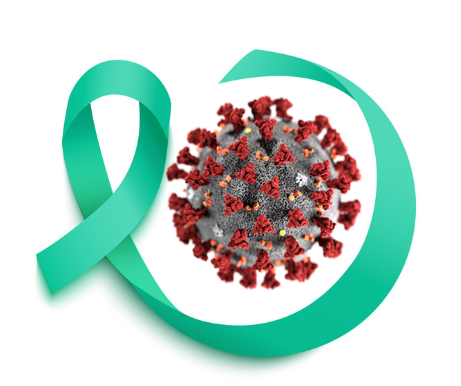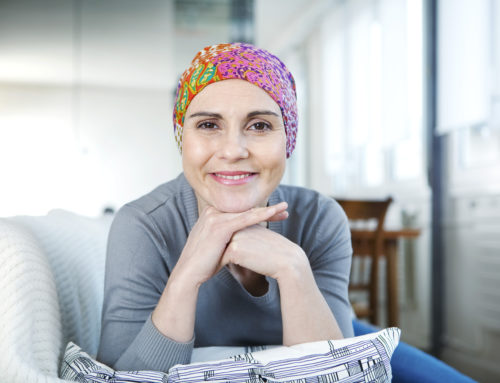LIVING WITH UNCERTAINTY DURING UNCERTAIN TIMES
The COVID-19 pandemic brings back memories of how vulnerable I felt during the early days of my ovarian cancer diagnosis and subsequent recurrences.
On the day I woke up from surgery and found out I had cancer, my life was suddenly filled with fear, uncertainty and a feeling of loss of control. I had so much anxiety—it was constant and felt like it was crawling on my skin! My support group peer facilitator told me that I wouldn’t always feel this way and that over time I would find my own way to cope.
I didn’t believe her.
There were so many unanswered questions swirling around non-stop in my head.
- How did I get this?
- What treatment will I have?
- Will the treatment work?
- How will I feel on treatment?
- Will I get a remission?
- If I do, will the cancer come back?
- If so, when? And where?
- What will happen to me and my family?
Before cancer, I could move forward by reading and figuring things out. This didn’t work anymore. Slowly, I began to understand that having a cancer diagnosis means that there are no guarantees. I met many other survivors in the same situation, feeling the same things, just hoping to be one of the lucky ones who tolerates treatment well and is cured. I realized I wasn’t alone.
I also realized that my peer facilitator was right.
It took many, many months, but I did learn new ways to cope and adjust to this “new normal.” Lots of counseling and connecting with others through in-person support groups and on-line survivor forums helped me accept that all my feelings were normal and human—and that it’s okay to ask for help (and sleep aids!) if the feelings get in the way of everyday living.
These strategies were helpful to me back then…and are also helpful now.
Shrink the “Worry Zone” / Focus on things that can be controlled
THEN: Thanks to the encouragement of my therapist at CancerCare, the first step I was able to take to regain a sense of control was to shrink my worry zone. Up until then, I was constantly worrying about every possible scenario that could ever happen—imagine a decision tree as big as a building! Shrinking my worry zone to just the things I needed to deal with today was tremendously helpful, because only then was I able to identify the things I could control. Most were simple—what to wear, what to eat, what music to listen to—but focusing on regaining control with these little things was extremely important to recovering my peace of mind.
Also, a fellow support group member shared her strategy of setting a daily time to worry. She gave herself permission to have a worry/pity party at 5pm every day. When anxiety and tears that threatened to invade at other times of the day, she reminded herself “Nope. Not now. We’re going to do that at 5pm.” I thought the idea was brilliant and it helped me too! Once in a while 5pm would even pass without a worrying session. When that happened, it was a lovely vacation from worry.
NOW: After being glued to the news all day every day for weeks, I realized that I needed a break. Now, I tune in only twice a day, in the morning for my governor’s update and in the evening for a 30-minute recap. I can’t control what other people are doing or saying, but I can control what I do to stay safe, both inside and outside of my home and, to some extent, inside my head. Shrinking this particular worry zone has given me the freedom to step away from things I cannot control.
Connect with people, meaning and purpose
THEN: I felt so alone. Soon after my diagnosis I had a great need to find “my people.” When I cried during a follow up appointment, my surgeon gave me a pamphlet for SHARE Cancer Support. I called the helpline and within an hour I was connected to an online forum and a support group and I started making plans to attend the Ovarian Cancer Research Alliance annual conference. These connections quickly became my lifeline.
I became extremely depressed during my second recurrence when achieving another remission didn’t seem likely. I joined a 6-week meaning-centered support group that included a legacy project. I chose to work on a cookbook to share my favorite recipes with my family. Working on this project gave me the opportunity to reflect on the so many wonderful people who have been in my life, all the good times and travel, and how meaningful my life has been.
NOW: Daily FaceTime sessions with family and friends and Zoom meetings are the highlights of my day. Looking forward to connecting with loved ones is enough to bring a smile to my face. And now I have time to work on the many projects that I’ve been putting off…like finishing that cookbook!
Find beauty and joy every day
THEN: When things felt especially “prickly” as I waited for scan results or it seemed like another recurrence was happening, my therapist recommended that I use a beautiful flower as an anchor when feelings get overwhelming. It felt silly at first, but finding beauty, along with calming breathing, has been very helpful! After my initial surgery, my sister sent me a Muppet Show collection on DVD. Laughter truly is the best medicine!
NOW: I try to get outside for a walk every day and look for new spring flowers. I let my heart swell whenever I hear about the beautiful acts of kindness from the community, such as restaurants offering free lunches for school children, people sewing masks for healthcare providers, volunteers shopping for high risk neighbors, people putting out Christmas lights and teddy bears for children stuck at home. I try to watch a sitcom just before bed so I can go to sleep with happy thoughts.
Make plans for now, and later
THEN: While I was in treatment, it was helpful to have a schedule to give the days structure and to always have something on the calendar look forward to. My husband and I spent a lot of time planning a big trip to the Mediterranean for after treatment. But I found just as much joy and pleasure looking forward to the little things like scheduled phone calls with a friend or a quick trip to get ice cream. Making plans is an investment in the future.
NOW: Even though we don’t know exactly when all this will be over, my family is making plans. Big plans, like a family trip to visit relatives on the other coast. And little plans, like dinners out and local adventures to share with my grandsons when I can hold them in my arms again. These plans for the future sustain me during the darkest moments.
2020
Having cancer taught me that I could find a way to LIVE with uncertainty, and those lessons are helping me deal with all the disruptions and uncertainty with COVID-19 pandemic. I choose to hope for the best while preparing for the worst. While following safety guidelines and social distancing measures, I refuse to let cancer or coronavirus or fear steal any of today’s joy.
Hoping you and your loved ones stay safe and healthy.
Annie
Globe-athon is proud to partner with Smart Patients, an online community where patients learn from each other about their cancer journeys. On Smart Patients, you can discuss issues raised in this blog post and beyond. Join here: https://www.





